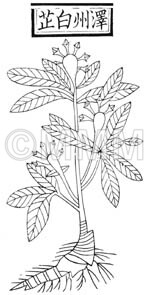Crude drug sample data base
※Click on the image to enlarge it.
Scientific information data base
| Common name | 白芷, Baizhi, Angelicae Dahuricae Radix (JP18, CP2020), Angelica Dahurica Root (JP18), Dahurian Angelica Root (CP2020) | |||||
|---|---|---|---|---|---|---|
| Synonyms | 川白芷, 杭白芷, 祁白芷, 禹白芷 | |||||
| crude drug image |
| |||||
| Original plant name | Angelica dahurica Bentham et Hooker filius ex Franchet et Savatier1, Angelica dahurica var. pai-chi Kimura, Hata et Yen2, (Yoroigusa1, Karabyakushi2) | |||||
| original plant image |
| |||||
| Family name | Umbelliferae | |||||
| Used part | root | |||||
| Quality for selection | Good Baizhi is white and has no insect damages, and has a very strong odor. (TN) | |||||
| Official compendium | JP XVIII,CP (2020 ed.) | |||||
| Clinical application | As an analgesic, sedative and for draining of pus, Baizhi is applied for headache, toothache, rhinitis and women's blood trouble. | |||||
| Medical system | Traditional Chinese medicine | |||||
| Drug effect in traditional medicine | Traditional classification | Diaphoretics with warm property | ||||
| Beneficial effect | [Property and Flavor] Warm; pungent. [Meridian Tropism] Stomach, large intestine and lung meridians. [Actions] To release the exterior and dissipate cold, dispel wind and relieve pain, open nose orifices, dry dampness and check vaginal discharge, disperse swelling and expel pus. [Indications] Common cold, headache, supra-orbital bone pain, nasal congestion, nasal discharge, allergic rhinitis, sinusitis, toothache, vaginal discharge, sore, ulcer, swelling and pain. | |||||
| Chemical constituent | Coumarins Angelica dahurica (*C1): Byakangelicin, Byakangelicol, Oxypeucedanin, Imperatorin, Phellopterin, Xanthotoxin, Marmesin, Scopoletin, Anhydrobyakangelicin, Neobyakangelicol A. dahurica var. pai-chi (*C1): Byakangelicin, Byakangelicol, Oxypeucedanin, Imperatorin, Phellopterin, Xanthotoxin, Marmesin, Scopoletin, Anhydrobyakangelicin, Neobyakangelicol, Isoimperatorin A. formosana (*C1): Phellopterin, Oxypeucedanin, Imperatorin, Isoimperatorin, Bergapten, Oxypeucedanin hydrate | |||||
| Chemical structure |
※画像をクリックすると、拡大して表示されます。 | |||||
| Pharmacological effect | Sedation (decoction), hypertensive action of central origin, acceleration of respiratory movement (ether extract), antibacterial (dysentery bacillus, Salmonella typhi, Gram-positive, Mycobacterium tuberculosis). | |||||
| DNA sequence | D44553, AJ131292, U78416, U78476, AF169270,A F169271, AF169268, AF169269; Traditioal Medical & Parmaceutical Database. | |||||
| Classical reference (Chinese Herbal Classic "Zhenglei bencao") |  ※Click this image to see the actual image ※Click this image to see the actual image | |||||
| Disease | Headache, Toothache, Rhinitis, Pyogenic dermatosis, Leukorrhea, Swelling and pain of joint, Itching, Snake bite | |||||
| Formulation | Uyakujunkisan, Kakkoshokisan, Kufushokutsuto, Keigairengyoto, Keigairengyoto, Goshakusan, Jijintsujito, Jijinmeimokuto (Jinkimeimouto), Jurokumiryukiin, Jokinritsuansan, Joyowaketsuto, Shin'isan, Jinkimeimokuto, Seishitsuketanto, Seijokentsuto, Seijobofuto, Senkyuchachosan, Sokeikakketsuto, Naitaku-san, Naitaku-san, Botanpisan | |||||
| References | JP18: The 18th edition of the Japanese Pharmacopoeia. CP2020: Pharmacopoeia of the People's Republic of China 2020 edi. C1)The Encyclopedia of Wakan-Yaku with Color Pictures Vol. I, pp 51-52. | |||||
| Remarks | The Pharmacopoeia of the People's Republic of China defines Angelica dahurica (Fisch. ex Hoffm.) Benth. et Hook. f. and A. dahurica (Fisch. ex Hoffm.) Benth. et Hook. f. var. formosana (Boiss.) Shan et Yuan as Baizhi. The synonym of the latter is A. dahurica (Fisch.) Benth. et Hook. f. var. pai-chi Kimura et Yen. The former is the original plant of Gibyakushi (祁白芷) and Ubyakushi (禹白芷). The latter is the original plant of Kōbyakushi (杭白芷) and Senbyakushi (川白芷). They are cultivated in northern and southern China, respectively. The Japanese Byakushi is the root of Angelica dahurica (Jap. name: Yoroigusa). | |||||
| Last renewal date | 2021/09/27 | |||||














